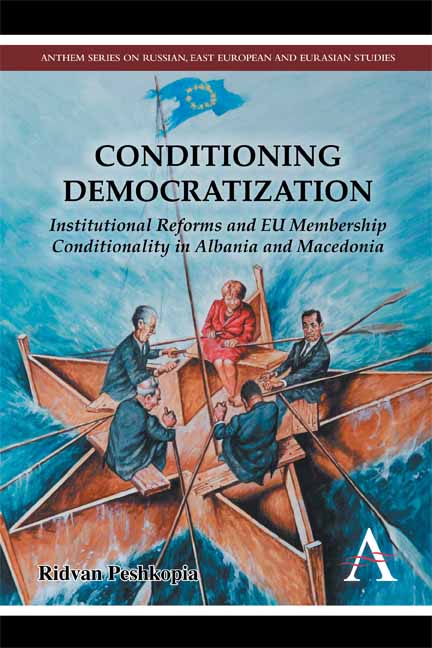Conditioning Democratization
Institutional Reforms and EU Membership Conditionality in Albania and Macedonia
Ridvan Peshkopia
Select Format
Title Details
- ISBN: 9780857283252
- April 2014
- Pages: 352
- Imprint: Anthem Press
How much, and under what conditions, can the European Union affect democratization and democratic consolidation in prospective member states? What mechanisms does the EU employ to influence reforms in countries emerging from authoritarian rule? Focusing on Albania and Macedonia, two postcommunist countries with a legacy of internal conflict, “Conditioning Democratization” analyzes the relationship between EU accession conditionality and institutional reforms. It focuses on four sectors of reform that are often overlooked in other studies: constitutions, asylum, local decentralization and the judiciary system.
The volume critically reviews the theory of “consociational democracy,” often considered the key to stabilizing deeply divided countries, and reapplies it to the supranational institution of the European Union. In articulate, accessible prose, Ridvan Peshkopia builds on examples from multiple sectors in multiple countries to reconceptualize this theory and show that the EU can indeed use membership conditions as a tool to encourage and direct reform.
Ridvan Peshkopia teaches political science at the University for Business and Technology, Kosovo.
Preface; Abbreviations; Chapter 1: Introduction; Chapter 2: A Sectorial Contextual Approach to the Effects of EU Membership Conditionality on Eastern European Institutional Reforms; Chapter 3: Constitutional Reforms in Albania and Macedonia: Conditioning Consociational Practices for EU and Domestic Democratic Stability; Chapter 4: Local Decentralization Reform; Chapter 5: Judicial Reforms; Chapter 6: Asylum Reforms; Chapter 7: Beyond Reforms; Chapter 8: Conclusions; Appendix A: The Demographic Dynamic of Macedonia since 1981; Appendix B: Ohrid Framework Agreement; Appendix C: Analysis of the Fulfillment of the the European Commission’s Recommendations to Albania, November 2010, According to 2011 and 2012 Progress Reports; Appendix D: Geographic and Political Divisions of Historical Macedonia; Notes; References; Index
“This is an engaging, informative and well-structured account which explores some very pertinent and perennial questions. Peshkopia is an EU expert and a Balkans insider.” —Dr Othon Anastasakis, director of South East European Studies at Oxford
Related products
-
Youth Movements and Generational Politics, 19th–21st Centuries
Edited by Richard G. Braungart, Margaret M. Braungart
April, 2023
£200.00 / $200.00 -
Rethinking Pakistan
A 21st Century Perspective
Edited by Bilal Zahoor, Raza Rumi
September, 2020
£125.00 / $125.00 -
Financial Engineering of Climate Investment in Developing Countries
Nationally Appropriate Mitigation Action and How to Finance It
Søren E. Lütken
June, 2014
£115.00 / $115.00 -
Democracy, Social Justice and the Role of Trade Unions
We the Working People
Edited by Caroline Kelly, Joo-Cheong Tham
September, 2021
£125.00 / $125.00 -
Empirical Assessment in IHL Education and Training
Better Protection for Civilians and Detainees in Armed Conflict
Jody M. Prescott
August, 2021
£125.00 / $125.00 -
The Life and World of Francis Rodd, Lord Rennell (1895-1978)
Geography, Money and War
Philip Boobbyer
January, 2021
£125.00 / $125.00







